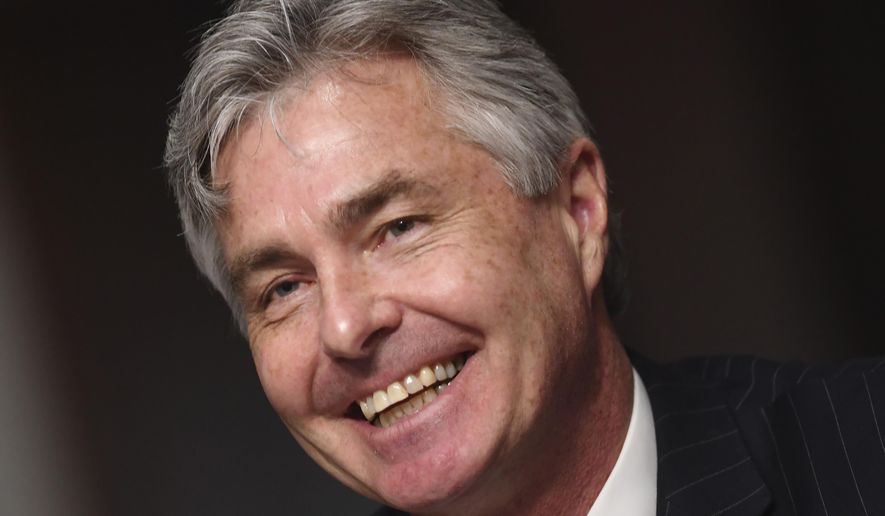The culture of the U.S. Navy has been “tarnished” by a string of disciplinary and operational missteps in recent years, most recently with the handling of the coronavirus outbreak aboard the USS Theodore Roosevelt, President Trump’s pick to lead the troubled military branch said Thursday.
Kenneth Braithwaite, a retired rear admiral now serving as U.S. ambassador to Norway, told a Senate Armed Services Committee confirmation hearing Thursday he would set the proper tone at the top and work to restore the appropriate culture if confirmed as the next secretary of the Navy.
“It saddens me to say that the Department of the Navy is in rough waters due to many factors, but primarily the failure of leadership,” he told lawmakers in a visibly distanced hearing room on Capitol Hill beside bottles of hand sanitizer and disinfectant.
In a break with congressional tradition, the nominee’s family was unable to attend the hearing due to precautions in place throughout Congress to prevent the spread of COVID-19.
Mr. Braithwaite was tapped to the top civilian post in the Navy last November, but his confirmation process had moved slowly. If confirmed, the former naval aviator will succeed former Secretary Richard Spencer, who lost his job after clashing with President Trump over the legal ordeal of Navy SEAL Chief Special Operator Edward Gallagher, who was accused of war crimes in Iraq.
Mr. Braithwaite, a graduate of the U.S. Naval Academy who worked on Mr. Trump’s 2016 campaign, would face arguably the toughest task of his career should he be confirmed.
A host of recent scandals have generated near-constant negative headlines for the service, at a time when the Navy also is struggling to ward off Russian power plays in the Arctic, Chinese expansion in the South China Sea and other key geopolitical priorities.
But the Navy’s internal politics have overshadowed those challenges.
Most recently, Acting Navy Secretary Thomas Modly, Mr. Spencer’s interim successor, was himself forced to step down following a public clash with Capt. Brett Crozier, who headed the USS Theodore Roosevelt as COVID-19 swept through the ship and forced the nuclear-powered carrier to dock in Guam.
Mr. Modly relieved the captain of his command after a letter Capt. Crozier wrote urging action to help his stricken crew was leaked to the press, and then flew to Guam to publicly and profanely scold the Roosevelt crew for cheering their fired commander.
Mr. Modly resigned in the PR firestorm that followed, and Pentagon officials now are weighing whether to restore Capt. Crozier to his post on the Roosevelt.
“The Navy chain of command is in disarray,” said Rhode Island Sen. Jack Reed, the committee’s ranking Democrat, citing the Roosevelt fiasco.
“It goes to trust,” Mr. Reed continued. “It goes to the culture of the Navy. It goes to reliance on the chain of command by the authorities, getting advice and supporting them.”
Mr. Braithwaite told the committee that the Navy’s recent run of problems, including collisions at sea, troubles with the military judicial system and the USS Roosevelt incident were “all indicative of a breakdown in the trust of those leading the service.”
He said that he supports an expanded inquiry into the Roosevelt incident and told lawmakers that “whenever you’re confronted with a challenge like this, it’s best to pause, consider all the facts and then make the right decision.”
“I learned that in flight school, as a young naval aviator, that whenever any bell or whistle went off in your cockpit, the most important thing to do is to sit on your hands for two seconds, … because then you can assess the problem correctly before shutting down the wrong system.”
On another issue, Mr. Braithwaite vowed to be a strong advocate for a 355-ship Navy, the goal many on Capitol Hill have called for but one many in the Navy itself have only reluctantly embraced.
“Sir, [the fleet] needs to be minimally 355 ships,” Mr. Braithwaite told committee Chairman Jim Inhofe, Oklahoma Republican. “Hopefully we build beyond that.”
“That’s a good, brief answer. I appreciate that. I won’t ask why because I agree with you,” Mr. Inhofe responded.
The committee is expected to advance Mr. Braithwaite’s nomination, and a full Senate vote will likely be held in the coming weeks.
• Lauren Toms can be reached at lmeier@washingtontimes.com.
• Ben Wolfgang can be reached at bwolfgang@washingtontimes.com.




Please read our comment policy before commenting.